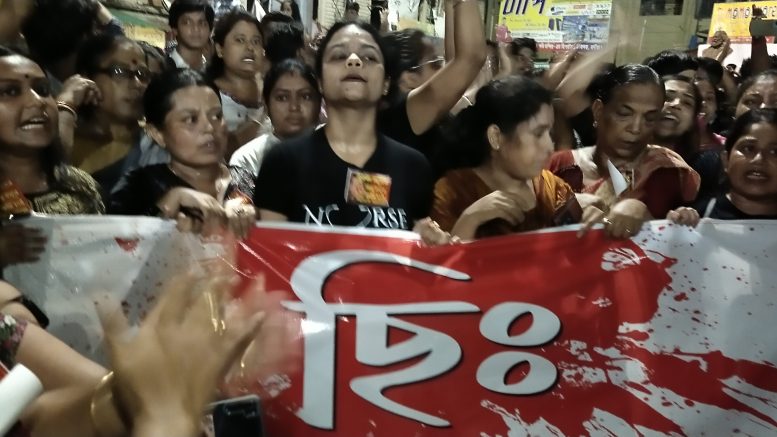Chakdah, Aug. 14: On the eve of India’s 78th Independence Day, a nation that prides itself on its democratic values and freedom was jolted by the collective cry for justice as thousands of women, supported by many men, took to the streets to join the #ReclaimTheNight movement. This massive protest follows the horrific rape and murder of a young lady doctor at the RG Kar Medical College and Hospital in Kolkata last week, an incident that has sent shockwaves across the country.
 The brutal assault, which occurred within the confines of a respected medical institution, has unleashed a wave of anger and fear, reverberating far beyond the city of Kolkata. The young doctor, who had dedicated her life to saving others, became the latest victim of a growing crisis of violence against women in India. The heinous crime has sparked outrage and despair, raising urgent questions about the safety of women in both public and private spaces, and highlighting the systemic failures that continue to allow such atrocities to occur.
The brutal assault, which occurred within the confines of a respected medical institution, has unleashed a wave of anger and fear, reverberating far beyond the city of Kolkata. The young doctor, who had dedicated her life to saving others, became the latest victim of a growing crisis of violence against women in India. The heinous crime has sparked outrage and despair, raising urgent questions about the safety of women in both public and private spaces, and highlighting the systemic failures that continue to allow such atrocities to occur.
In response to this tragedy, the #ReclaimTheNight movement gained unprecedented momentum, with women from all walks of life uniting to demand justice.
 #ReclaimTheNight movement began in Leeds in 1977 as part of the Women’s Liberation Movement. Initially, it involved marches across England that called for women to have the freedom to safely navigate public spaces at night. These marches continued until the 1990s. The movement was later revived and now organizes annual, nationwide marches to protest rape and violence against women.
#ReclaimTheNight movement began in Leeds in 1977 as part of the Women’s Liberation Movement. Initially, it involved marches across England that called for women to have the freedom to safely navigate public spaces at night. These marches continued until the 1990s. The movement was later revived and now organizes annual, nationwide marches to protest rape and violence against women.
In Kolkata, the streets were filled with protestors holding placards and chanting “We demand justice!” as they marched through key locations in the city. The movement spread like wildfire, with similar demonstrations occurring across various towns in Nadia district, including Kalyani, Gayeshpur, Chakdaha, Ranaghat, Badkulla, Krishnanagar, Santipur, Karimpur, Bethuadahari, and Tehatta.
In these towns, women of all ages, many of them clutching candles in their hands, joined the protest walks to draw the attention of the administration and the wider public. The candlelight marches, a somber yet powerful display of solidarity, were aimed at demanding swift and stringent action against the perpetrators of this horrific crime. The scenes of women walking in silence, their faces illuminated by the flickering candlelight, were a stark reminder of the pain and anger gripping the nation.
marches, a somber yet powerful display of solidarity, were aimed at demanding swift and stringent action against the perpetrators of this horrific crime. The scenes of women walking in silence, their faces illuminated by the flickering candlelight, were a stark reminder of the pain and anger gripping the nation.
In Chakdah, the protestors gathered in front of the police station. Jhumpa Goswami, sister of eminent cricketer Jhulan Goswami, who joined the protest said, “I feel pained, I feel ashamed about the horrific rape and murder of the doctor. I joined the protest only to see an end to this horror. How long should we need to wait for free of the threat of rape and sexual torture?”
 The protests also highlighted a broader issue— the ongoing struggle for women’s safety in India. Despite numerous laws and reforms aimed at protecting women, incidents of sexual violence remain disturbingly frequent. The public outrage following the Kolkata incident has reignited debates about the effectiveness of these measures and the need for more comprehensive action to ensure the safety and dignity of women across the country.
The protests also highlighted a broader issue— the ongoing struggle for women’s safety in India. Despite numerous laws and reforms aimed at protecting women, incidents of sexual violence remain disturbingly frequent. The public outrage following the Kolkata incident has reignited debates about the effectiveness of these measures and the need for more comprehensive action to ensure the safety and dignity of women across the country.
As the nation celebrates its hard-won independence, the calls for justice for the young doctor in Kolkata serve as a sobering reminder that true freedom and security remain elusive for many women in India. The #ReclaimTheNight movement stands as a testament to the resilience and determination of women who, in the face of unspeakable violence, continue to fight for a future where they can live without fear.

